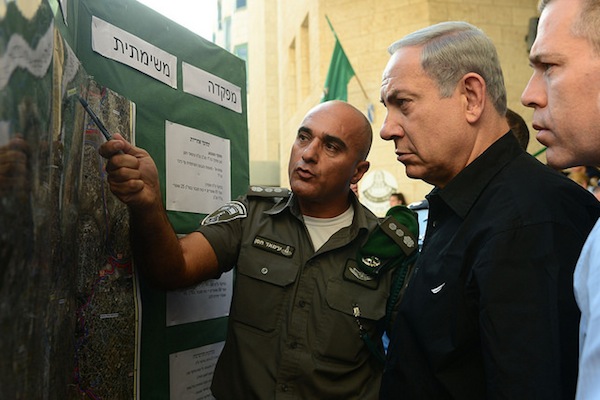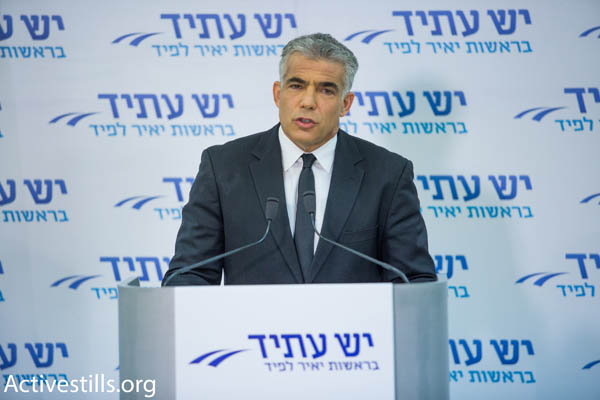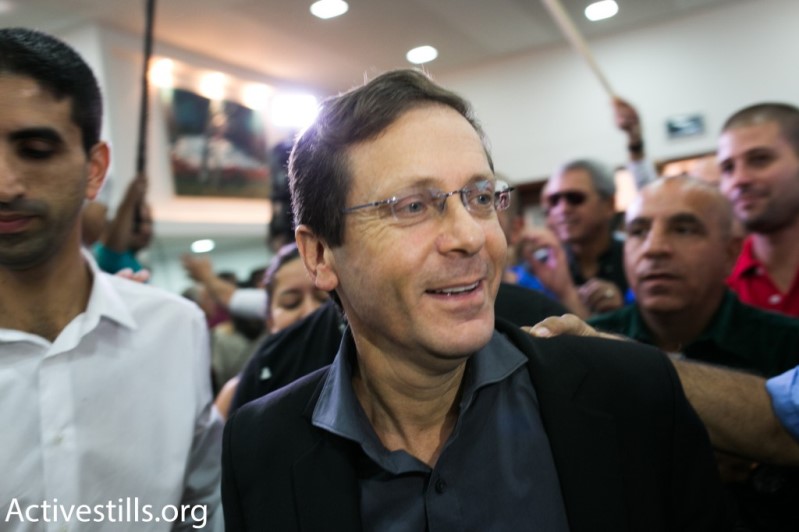When members of the opposition are trying to outflank Netanyahu on the right, even the IDF seems like a saner alternative to Israeli politicians.
By Yoni Mendel

“A nation in uniform,” “an army that has a state,” “a democracy of army bases.” In academic research of the critical kind, Israel is understood as a militaristic state.
This, among other things, is what the sociologist Baruch Kimmerling meant when he said, “whether we want it or not — we are a clearly militaristic society, and this militarism is also a central principle around which Israeli society is organized.” Uri Ben Eliezer wrote about Israel as a “nation in uniform,” researching the military characteristics of Israeli society. Oren Barak analyzed the development of “Israeli security networks” and their social and political role in the country.
In other words, much academic research has been dedicated to the topic. It is not difficult to find quotes from Israeli policymakers, most of them (unsurprisingly) Jewish men who served in high-ranking positions in the IDF — men who straddle the line between military and civil society in Israel. This begins with IDF Chief of Staff Yigal Yadin’s declaration in the 1940s that “the Israeli civilian is a soldier with 11 months leave” and continues with Prime Minister Netanyahu’s remarks that Israel must “forever live by the sword.”
Lapid vs. Abbas and the security establishment
On the backdrop of Israel’s militarism, it is important to say a few things about the security establishment. This past month has seen a great number of examples that show how this establishment, and specifically the IDF, has begun to be viewed by the Israeli leadership — both by the government as well as by both the coalition and what, for some reason, is deemed the “opposition” in the Knesset — as outdated, irrelevant, ignorant, and deceitful.
This began with the violence and stabbings in October 2015. The propagandists of the Israeli government announced openly that Palestinian President Mahmoud Abbas’ incitement was behind the uprising. The demagoguery quickly became the prominent message, with the media quickly adopting the words “incitement” and “Abbas” as inseparable. Deputy Minister of Foreign Affairs Tzipi Hotovely went as far as to organize a training for senior members of the ministry focusing on “incitement,” which included talks by researchers who support her worldview. The same happened with Culture Minister Miri Regev, Energy and Water Resources Yuval Steinitz, Justice Minister Ayelet Shaked, and others.
What did the “opposition” do in the meanwhile? It isn’t hard to guess. MK Yair Lapid fell into line, stating that “Abbas is continuing with his crusade of incitement,” adding his own bit of militarism and claiming that “anyone who harms us will bear responsible for the outcome.”
On the other hand, we have an organization called the IDF’s Intelligence Corps. As opposed to the incitement of the right and the left, the corps released the following two professional assessments: “Abbas is not inciting in order to harm Israelis,” and “Abbas is considered a very moderating force in Judea and Samaria.” How did Education Minister Naftali Bennett respond? “The security establishment is wrong.”
This continued with the banning of the Northern Branch of the Islamic Movement; a movement that has the support of one-third of Muslims in Israel, that has a network of schools and restaurants, and which has its own newspaper. This movement, we must remember, has existed in a reality in which “Israel’s Arab citizens have been discriminated against since 1948 because they are Arab,” according to the government-appointed Or Commission. The cabinet, however, decided to outlaw the group, as opposed to outlawing discrimination and those who support it. After all, some of them hold high-ranking positions among the Israeli leadership.
There is no reason to provide a stage for the remarks coming from government ministers, who all sang the same tune against the Islamic Movement. Not a single one of them actually knows the movement, aside from a few choice quotes provided by a “research organization” whose ideas match up with theirs. But let’s see what those in the “opposition” thought about the decision. There, the leader of the “opposition,” Isaac Herzog, described the ban as the “first step in protecting democracy.” His co-leader, Tzipi Livni, added that she supports the ban. When asked why she didn’t take the same step when she was justice minister, she responded that the Shin Bet didn’t support it.
Had Livni maintained the same security-oriented stance she held back then, she would discover that the Shin Bet actually did publish a response to the ban. It turns out that the Shin Bet expressed doubts about banning the Northern Branch of the Islamic Movement. In fact, the Shin Bet believed that doing so will only lead to more unrest among Israel’s Arab citizens. This is not a new position. It was presented to the government in 2014, when the Shin Bet wrote that “there is no intelligence that connects the Islamic Movement to real violent activity,” and that it opposes banning the group. Netanyahu, Livni, Herzog and others didn’t seem to care. Yair Lapid did not disappoint and praised the move.
Jewish Home vs. the IDF
The same phenomenon continued and reached the Israeli street. Over the last few days, as the violence in the West Bank has continued to flare up, and protests have begun to take place primarily in refugee camps, the same voices could be heard from the benches of the government. But there is no real need to give a stage to the extreme remarks by government ministers about what is happening in the West Bank. We must give the right to respond to the representatives of the “oppositional right” of Herzog-Livni-Lapid, and only after that give the IDF a chance to respond.
The representatives of the Zionist Union have already proposed it all. Herzog has already proposed that Netanyahu’s coalition put the West Bank on lockdown, place all the Palestinian neighborhoods in East Jerusalem under closure, and consider calling up a large number of reserve soldiers. Chairman of the Council of Judea and Samaria (Yesha Council) Avi Ro’e, saw eye to eye with Herzog, stating that the opposition head would “do a much better job at dealing with Palestinian terror.”
As opposed to the hawkish views of Herzog, Netanyahu, Livni, Shaked, Lapid, Regev, Bennett and others, the IDF Central Command provided a different perspective. The commander of the Central Command stated that the terror attacks are not the result of institutionalized incitement or work of a terrorist organization, but rather part of a “limited uprising… and the attacks are inspired by other attacks, not by a centralized leadership… the terrorists are young, desperate, and frustrated, some of them are unemployed.”
According to Central Command, the violence can be stopped through easing restrictions: “economic relief, including providing more permits to work inside Israel, providing building permits in Area C, releasing prisoners, and approving the supply of weapons to the Palestinian Authority.” The government’s disdain for the IDF recommendations was difficult to hide. MK Moti Yogev (Jewish Home) toed the line of his friends from the right, stating that the army’s assessments were, put simply, “irresponsible.”
The swan song?
It is difficult to belittle the phenomenon we see before our eyes. It is also difficult to write these things, when considering the military’s involvement in our daily lives — an organization that deals with security, that has a clear preference for men, that excludes Arab citizens and is seen by many of them as the enemy for fighting their brothers — is a process that Israeli civil society must limit, not to mention refrain from celebrating.
The latest phenomenon reveals that both the army and the security establishment know that while the gut thinking of people like Netanyahu and Herzog might win elections, it is not good for the citizens of Israel. Palestinians live under occupation, and there is nobody who knows this better than the power hat occupies them: the commanders of the Central Command, which has been in control of the West Bank since 1967. They know that Palestinians in Al-Fawar refugee camp are desperate and frustrated.

We are also coming to terms with the political shallowness in which we are living: an extreme right-wing government that wins the support of the “opposition” for every violent step it takes, even if the price is rejecting assessments by state security experts. These are members of Knesset who think only of the next primaries, of how to give the public what it wants, as long as it is viewed as “relevant.” In reality, this translates to thinking of solutions that promote Netanyahu’s theory of living by the sword.
Perhaps this is the swan song. No one can promise that this kind of thinking will not eventually permeate the IDF. Perhaps soon the army will not abide solely by security-based thinking — which in itself is limited and limiting — but will start taking cues from the legislative and executive branches of the government.
Forget for a moment about stopping the attacks, forget about granting freedom to a nation we have been controlling for nearly 50 years. What’s really important is whether the candidate will be viewed as more nationalist than the nationalists. The recipe is simple, and the dish is being cooked up daily in the Israeli political kitchen: for everything Netanyahu says, say something even more extreme. And whenever the army says something, just oppose it and say that the security establishment is wrong and misleading the public.
Woe to us that we are resigned to put our trust in human rights, clearheaded thinking, and restraint in the hands of an army. An organization that is, first and foremost, dedicated to security. But as the Jewish sages said, “in a place where there are no men, strive to be a man.” And today, more than ever, it seems that both the opposition and coalition are bereft of decent people.
Yoni Mendel is the projects manager of the Mediterranean Unit at the Van Leer Jerusalem Institute, and co-editor of the book review section of the Journal of Levantine Studies (JLS). This article was first published in Hebrew on Local Call, where he is a blogger. Read it here.



